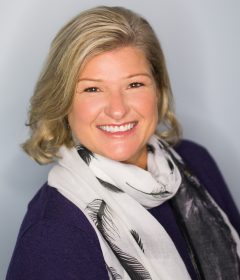Emily Kettleson is an artist. You can see her love of expression in the way that she focuses intently when she draws, and the pride with which she shows off her portfolio. However, most people do not see that side of her. They only see her developmental disabilities.
Fortunately, Michelle Laviolette was able to see Kettleson’s strengths and potential. Laviolette is Branch Manager of the local VanCity Credit Union branch in Tsawwassen, B.C., and is also President of the city’s Business Improvement Association. Kettleson and Laviolette are both participants in a program called MentorAbility, an initiative of The Canadian Association for Supported Employment (CASE).
 MentorAbility is a mentoring experience in which job seekers with disabilities (Protégés) are matched with individual Mentors, who are private business owners and managers, non-profit leaders, public sector employers, working artists, etc., to explore career opportunities. Protégés gain experience, knowledge and skills to assist them in making decisions about their future, and to help them get a head start in their desired field of interest. The program has been tested for five years in BC, Ontario, Quebec and the Atlantic provinces.
MentorAbility is a mentoring experience in which job seekers with disabilities (Protégés) are matched with individual Mentors, who are private business owners and managers, non-profit leaders, public sector employers, working artists, etc., to explore career opportunities. Protégés gain experience, knowledge and skills to assist them in making decisions about their future, and to help them get a head start in their desired field of interest. The program has been tested for five years in BC, Ontario, Quebec and the Atlantic provinces.
Laviolette took the time to get to know Kettleson, showing her around her workplace and introducing her to staff. As they spent more time together, Laviolette learned more about Kettleson’s gifts, personality, and dreams. She offered Kettleson a job at Tsawwassen’s Business Improvement Association office. Being involved with the MentorAbility program has been a great experience for both Laviolette and Kettleson.
CASE is a national association of community-based service providers and stakeholders working towards employment inclusion for people like Kettleson, who have a desire to be included in the community and to improve their skills and abilities. Annette Borrows is the President of CASE’s Board of Directors.
Borrows is a changemaker, and has long been a champion of MentorAbility. Through this program and many other initiatives, Borrows and her Board strive to increase capacity, employment and personal fulfillment for persons with disabilities. At the same time, they want to help employers learn more about individual disability experiences, recognize talent and potential, tap into a pool of potential future employees, and demonstrate community leadership.
CASE has created and delivered several programs related to persons with disabilities. As an umbrella national body, CASE has designed awareness and support services, and implemented them in conjunction with its over 100 association members. For example, CASE is behind Disability Employment Awareness Month (DEAM), an annual awareness campaign that takes place each October. DEAM promotes and celebrates the many and varied contributions of workers with disabilities.
CASE strives to spread the important message that a strong workforce is one inclusive of the skills and talents of all individuals, including people with disabilities. Their MentorAbility program is putting that message into action.
Protégés in the Mentorability program like Kettleson start by identifying their interests and what type of career they would be interested in exploring. For example, a number of Protégés expressed a desire to work in the videogame industry. Garth Johnson, CASE’s Alberta Board member, established a link to EA Games, a large videogame company based in Vancouver. The company brought together over 30 Talent and Acquisitions team members from across North America to participate in a MentorAbility event.
Brandon Gabriel is an Indigenous artist from the Kwantlen Nation in Fort Langley, B.C. His company, Legacy/Gabriel Concepts, specializes in public art installations, paintings, photography, graphic design, and educational modules for school settings. Gabriel’s work has been exhibited in the United Kingdom, Hong Kong, USA and across Canada. He joined the MentorAbility program as a Mentor, and is extremely proud of the progress of his Protégé, Kurtis. The two have formed a firm bond of friendship.
In February 2019, with government support, MentorAbility became a national project, with plans to replicate the program in all provinces. They are in the process of recruiting over 1000 employers to mentor 1000 new Protégés.
The new MentorAbility Canada Project has a number of far-reaching goals. In addition to mentoring Canadians with disabilities, it will set up an ecosystem of social partnerships – uniting the efforts of government, businesses, and community organizations and developing lasting relationships.
According to Borrows, MentorAbility is ultimately about creating new paradigms.
“Most of us have someone like Emily or Kurtis in our lives”, says Borrows, “but too often employers don’t think of them as possible employees. Through the MentorAbility program, we hope that Canadian businesspeople will see the real person behind the disabilities – someone with talents, passions and unique abilities to bring to the workplace. It’s such an exciting project, and we know it is changing the lives of our Protégés…and our Mentors as well.”








